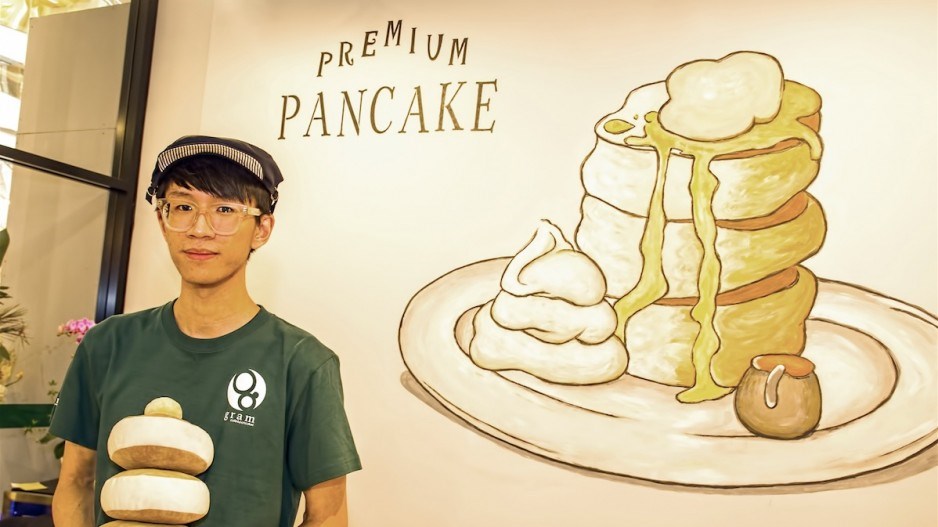What happened: Osaka, Japan-based Gram Cafe and Pancakes recently opened its first Canadian store in Richmond and has done a brisk business despite many consumers concerned about catching the novel coronavirus COVID-19 as a result of being in close proximity to others.
Why this matters: COVID-19 has rattled world stock markets and consumer buying habits while prompting some to reduce exposure to public spaces, but sufficient numbers of people are evidently so far willing to eat in restaurants in B.C.
Franchisee Vincent Ou opened his Gram Cafe and Pancakes restaurant at Aberdeen Centre on February 23. By the weekend of February 29 and March 1, he saw line-ups out the door, he told Business in Vancouver. BIV visited his restaurant on March 4, and at around 1 p.m. eight of his 13 tables were filled.
BIV followed up with Ou on March 9 and he said that the March 7 and 8 weekend was similarly busy, with line-ups out the door.
Ou had been concerned because he was monitoring traffic at the mall in the weeks leading up to his restaurant launch and he noticed that traffic was light. In recent weeks, the mall has become busier, he said.
Mall owner Thomas Fung agreed with the assessment. Fung told BIV that he thinks traffic at Aberdeen Centre fell by about 50% in January and early February, but has since bounced back somewhat and is at about 85% of what it was.
The return of customers is good news for restaurant owners, particularly those who have Asian restaurants, because some owners of Asian restaurants had previously told BIV that their businesses saw revenue plunges of about 80% after cases of the virus started to ramp up in China, and then worldwide.
Some of those owners are asking government officials to provide tax relief and landlords to defer rent.
With B.C. on March 9 reporting its first death caused by the virus, and five new cases for a total of 32 patients, the specter remains that consumers may limit visits to restaurants because they fear contracting the disease either from other diners or from food-preparation staff. After all, the worldwide count for the virus so far is 114,452 cases and 4,026 deaths, according to Johns Hopkins University Whiting School of Engineering.
Hourly chefs and food-preparation workers tend not to get paid if they call in sick, said restaurant consultant and Freelance Chef principal Tyrone Sadorsky, and he said that he doubts that restaurant owners will start providing that paid sick time in order to reassure customers.
Indeed, Ou told BIV that he would “probably not” provide paid sick time to hourly workers if they do get sick or have to be quarantined because the recommended isolation time for those who think they may be exposed to COVID-19 is 14 days.
“That’s as much as vacation pay,” Ou said.
Sadorsky said that the reality is that restaurant staff tend to go to work sick either because they cannot afford to stay home or out of a feeling of responsibility to the restaurant.
“Restaurants don’t have backup, or cooks to cover for [sick workers,]” he said. “It’s not so much that they are worried about their boss being annoyed. Professionals tend to know that if they don’t come in, it will really screw over the kitchen [operations.]”
Retired restaurateur Bud Kanke, who operated 11 restaurants during a 41-year career, told BIV from his winter home in California that if COVID-19 starts to scale up to the degree that much of the public wants to avoid public spaces as much as possible, there could be a large spate of closures among restaurants that are small businesses. He suggested that many of them will only be able to operate a few months unless they receive rent relief from their landlords. He doubts that governments will provide tax relief to the small business owners, and said that he thinks the governments would instead focus resources on the sick.
One trend that customers might start seeing is that all restaurant staff wear gloves, including servers and bartenders, Kanke said. Customarily, only workers who touch food wear gloves.
To give a sense of the scale of business disruption that is possible, global coffee giant Starbucks Corp. (Nasdaq:SBUX) revealed in a corporate filing on March 6 that in the month of February, its comparable store sales in China were down 78% versus the prior year, “primarily due to temporary store closures, reduced operating hours and severely reduced customer traffic.”
Prior to the COVID-19 outbreak, its executives expected comparable same-store sales growth in China to be approximately 3% in the second quarter of 2020. After the outbreak, on March 4, they revised that projection to be a 50% drop year over year. Only about 8% of Starbucks' revenue comes from China.
“We expect a COVID-19-related headwind of approximately US$400 million to US$430 million to China’s revenue in [the second quarter of 2020] versus prior expectations,” Starbucks said in its filing.
If the outbreak becomes anywhere near as large in the U.S. as it has been in China, many restaurant chains would face devastating losses in revenue.




